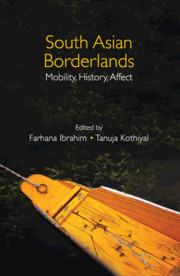Book contents
- Frontmatter
- Contents
- List of Figures and Tables
- Acknowledgements
- Introduction
- 1 Paradise at the Frontier: Kashmir as a Political Terrain and Literary Landscape in the Mughal Empire
- 2 Borders in the Age of Empire and Nation-States: The Honeycomb of Borderlands: Kumaun, Western Tibet and Far Western Nepal
- 3 Borders, Difference, Recognition: On the Cause(s) of Gorkhaland
- 4 Embattled Frontiers and Emerging Spaces: Transformation of the Tawang Border
- 5 Relative Intimacies: Belonging and Difference in Transnational Families across the Bengal Borderland
- 6 Reading Parijat in Nepal: The Poetics of Radical Feminism Negotiating Self and Nation
- 7 Commodity Journeys and Market Circuits: Making Borders ‘Natural’ in Colonial Western Himalayas
- 8 Frontiers, State and Banditry in the Thar Desert in the Nineteenth Century
- 9 Bureaucracy and Border Control: Ethnographic Perspectives on Crime, Police Reform and ‘National Security’ in Kutch, 1948–52
- 10 Frontier as Resource: Law, Crime and Sovereignty on the Margins of Empire
- About the Contributors
- Index
10 - Frontier as Resource: Law, Crime and Sovereignty on the Margins of Empire
Published online by Cambridge University Press: 17 September 2021
- Frontmatter
- Contents
- List of Figures and Tables
- Acknowledgements
- Introduction
- 1 Paradise at the Frontier: Kashmir as a Political Terrain and Literary Landscape in the Mughal Empire
- 2 Borders in the Age of Empire and Nation-States: The Honeycomb of Borderlands: Kumaun, Western Tibet and Far Western Nepal
- 3 Borders, Difference, Recognition: On the Cause(s) of Gorkhaland
- 4 Embattled Frontiers and Emerging Spaces: Transformation of the Tawang Border
- 5 Relative Intimacies: Belonging and Difference in Transnational Families across the Bengal Borderland
- 6 Reading Parijat in Nepal: The Poetics of Radical Feminism Negotiating Self and Nation
- 7 Commodity Journeys and Market Circuits: Making Borders ‘Natural’ in Colonial Western Himalayas
- 8 Frontiers, State and Banditry in the Thar Desert in the Nineteenth Century
- 9 Bureaucracy and Border Control: Ethnographic Perspectives on Crime, Police Reform and ‘National Security’ in Kutch, 1948–52
- 10 Frontier as Resource: Law, Crime and Sovereignty on the Margins of Empire
- About the Contributors
- Index
Summary
In March 1887, the Ahmednagar District Superintendent of Police, R. H. Vincent, requested sanction to offer a special reward to capture a bandit, ‘the notorious Bhil dacoit Daji walad Malhari’, who was wreaking havoc in his district. Daji had escaped from police in his native Hyderabad State the previous May after being extradited from the British-ruled Bombay Presidency. He had already absconded from the Nizam's or the British Raj's police thrice previously. According to the commissioner of the Criminal Department, Daji's activities threatened to undo colonial progress in remaking agrarian society in the frontier district:
The outlaw had actually recommenced his depredations in the [Ahmed] Nagar District. The Bhils on the British frontier, as he lately found have fairly settled down as labourers and cultivators, but the presence of a reckless leader will soon unsettle them, and Government may have endless trouble in the monsoon if the man is not caught speedily by the offer of a substantial reward.
Dacoit activity was constructed as a direct affront to British colonial policies of peasantisation and sedentarisation. As such, Bombay sought to induce Hyderabad to imprison figures such as Daji, a subject of the Nizam over whom the Raj had no jurisdiction. Daji, to whom we shall return, continued for the next several years to dog the colonial police with his border-hopping antics. His case underscores the indeterminate character of colonial legal sovereignty in frontier regions and the fragmented nature of sovereignty in an imperial era.
The liminal spaces of modern empires were many. They represented major challenges to officials and provided invaluable resources for people subjected to imperialism. The turn of the nineteenth century is often associated with the culmination of imperial consolidation in Asia and Africa but, in fact, empires remained heterogeneous entities unsettled by contested external frontiers and subordinated by sovereign polities within their domains. The fragmenting of sovereignty and the proliferation of jurisdictions produced possibilities for marginal people across imperial space. Extraterritorial judicial initiatives of colonial empires were limited by subordinated states’ attempts to safeguard their legal sovereignty. The legal history of the frontier between sub-imperial Hyderabad and British Bombay Presidency illuminates the productivity of fissures within imperial space during the height of European global political dominance.
- Type
- Chapter
- Information
- South Asian BorderlandsMobility, History, Affect, pp. 234 - 270Publisher: Cambridge University PressPrint publication year: 2021



